
When we first meet Sydney James Harcourt, neither of us are wearing pants.
Such is the beauty of interviews conducted via Zoom, where the camera never shoots below the torso (and no, we never did see below his torso, or vice versa). Despite the ongoing woes of the world, Harcourt has a very good reason to feel excited: Hamilton arrives on Disney+ July 3.
Born in Detroit, Harcourt moved to New York City to pursue life upon the wicked stage. Success didn’t elude him for long, as he landed the role of Simba in The Lion King and a major role in the Bob Dylan musical Girl From the North Country amid occasion television roles on TV series including Law & Order: SVU, The Good Wife and Elementary. His greatest success, however, came in 2015 when he created the role of James Reynolds in the original cast of Hamilton. The show became a full-blown cultural phenomenon, winning the Tony Award for Best Musical, and the Pulitzer Prize.
Hamilton reimagines the life of American founding father Alexander Hamilton and his arch-nemesis Aaron Burr, retelling their story through a combination of pop, rap and hip-hop music, and with people of color playing other American icons like George Washington and Thomas Jefferson. Sydney James Harcourt spent years performing in the show, eventually taking over the leading role of Aaron Burr from Leslie Odom, Jr. The distinction made Harcourt only the second actor in Broadway history to play the role.
How about we take this to the next level?
Our newsletter is like a refreshing cocktail (or mocktail) of LGBTQ+ entertainment and pop culture, served up with a side of eye-candy.
Now Hamilton comes to streaming, courtesy of a filmed production for Disney+. We snagged some time to chat with Harcourt about the wild rise of the show, the filmed version, his process, and what it means to be part of a theatre milestone. Hamilton arrives on Disney+ July 3.
It’s not every day you land a movie on Disney+…
And out of the blue.
They didn’t warn you?
I thought it would sit in the can for 15 years. Really. After we filmed it was top secret. We weren’t supposed to talk that it even existed. I found out from a text from a friend who was like oh my God, congratulations.
Wow.
I was like on what? She said “The Hamilton movie. It’s coming out.” I was like, it is?! So it’s one thing to know you have something coming up. It’s another to have no idea, and to not have seen it. A week and a half ago they sent us a screener and as high as my expectations for how good it could be were, it surpassed all of them.
That’s amazing to hear. I was impressed by the innovative format. It’s a mix of a vaudeville-type revue, a traditional musical and a concert. There’s this whole Brechtian element.
Oh yeah.
It’s exciting to watch. Seeing it live must be electric.
Yeah. I’ve seen it myself a few times live after I left the show. I gotta say, watching the movie—it’s exciting to be there in person, and the movie captures all that excitement. I think it will really start capturing that theatrical excitement when it starts showing in movie theatres. Then people will have that shared excitement before it begins in the theatre, and without the air of privilege that existed at the Rodgers [theatre] for even having made it through the doors. Either you paid $3,000 for last-minute tickets, you had to wait months to get in, or you won the lottery. This story is our right as Americans to know it, and I feel like finally for the low-low price of what Disney+ is charging, you can experience the show as many times as you want to see it.
Ok, well let’s take a step back a moment. You’ve been there from the beginning, and obviously been through a lot with this show. You were there in the workshop. You were there when it premiered on Broadway. You were there when it won the Tony, the Grammy, the Pulitzer when it became the hottest show on Broadway. Is it nerve-wracking for a filmed version to come out? Or is it more of a casual class reunion feeling?
Pure excitement and adrenaline. We’re sharing a secret thing we did in New York with the whole world, with the people who should hear it most. It’s a gift to make people feel part of the American experience, to make us all feel like one group: Americans. Which is something, I feel, we lack at times. We’re so caught up in our tribal lines and communities, or us vs. you and don’t step on my rights. We forget that we should have pride as Americans where it doesn’t matter who you are, what you look like or what you do: we’re all the same. Hamilton really gives you that feeling, especially seeing a multicultural cast in 2020 playing these parts. Jefferson might be turning in his grave, but he should be. They’re about to take all his statutes down. It’s just excitement.
Wonderful.
There is a class reunion element. Some of these people I talk to all the time. Renee [Goldsberry, who played Angelica] and I have been friends since The Lion King when she debuted on Broadway. Others have been off on some other journey, and you haven’t seen them. We all had a Zoom call after the screening. It was like getting together with The Sisterhood of the Traveling Pants.
[Laughter]
We all just talked about moments that we love and things we could see in the background that even the director didn’t notice. There’s no fear. The performances of those actors are so touching and passionate.
I think it will be huge. It’s fantastic to hear that you do all really have this camaraderie, this special thing that you get to share with 20 people or so. It’s yours. Nobody can take it away.
Yeah.
And what you say about unity—it’s so appropriate that Disney is bringing this out Fourth of July weekend. It’s a show all about America, about unity in almost a meta-postmodern way. And it comes at a time we all need it.
And in a time of fear, anger and strife, there is opportunity and creativity. Reasons to be positive.
Obviously, Hamilton is groundbreaking for a lot of reasons. Because it is so experimental, did you ever fear the show flopping?
I was with it from the workshop. I’d heard the demos, the original mixtape that Lin-Manuel [Miranda] put out. I auditioned with the George Washington material. Even from those little pieces, I thought it was authentic-sounding in a pop idiom. I think one of the reasons Broadway isn’t as big of a national pastime as it could be—besides the price—is that around the 50s and 60s they let go of staying current. It used to set the standard for what was on the top 10. But when electric music came along, Broadway was sort of like we’re good. We don’t wanna move forward.
Absolutely. Yes.
I always wished as an actor that we’d produce more shows to bring more people into the fold. One of the reasons I think it’s hard for a lot of Broadway shows to exist is that it is such a small audience. You’re not going to get a ton of kids—especially those in inner cities—who are going to want to listen to a Sondheim show.
Right.
So when I heard this, that’s the chord it struck in me: something to speak to the masses. I think we all felt that it was going to be the biggest thing on Broadway if only for the concept. But there’s no way that we could have known that the Pulitzer, the Grammy, all the Tonys. I’ve met the Obamas three times.
My Lord.
The Clintons. Nancy Pelosi. My political heroes. My entertainment heroes. Everyone except Mariah Carey.
I wonder what she was doing…
There’s no way I could fathom it would become this thing. As a Broadway artist, you don’t think about being a mainstream thing, you know you’re a niche thing. So in the same exact way, I don’t think we have a concept of how big it will be.
[A beat. He chokes up.]
Sorry, it’s very emotional for me. Children who don’t have access to these kind of shows [will see them]. Growing up in Detroit I couldn’t imagine ever going to see this kind of show. It never would have happened. When I was in the show I could barely afford to have my family come and see it. Now that people can just watch it, there’s no way to overstate the impact it will have on generations to come.
You created the role of James Reynolds. I did some digging to find out if he was actually a real person, and how closely the show follows the details of his life. In short, I found very little.
That’s true.
But he’s a pivotal character. As an actor, when you don’t have much in the way of research, how do you go about creating a character?
For James, in particular, [Ron] Chernow [who authored the biography that served as the basis for the show], there was enough there glean his intentions and see the archetype of who he was. He was an opportunist involved in many schemes, not just extortion, but bond schemes, land schemes, all sorts of nonsense. I took a broader look at the history. I read the Chernow biography. I read Chernow’s Washington. And I read a lot about Aaron Burr. So I got a sense of the rag-tag, scrabble person he would be.

Alright.
Then, as an actor, you take all the information that’s available, and use your imagination to flesh this person out in a way that is going to be vivid and memorable, and hopefully bring the world “cuckold” to prominence.
[Laughter]
If there’s one thing I can be known for in life, it’s that I brought the word “cuckold” out. The other thing about theatre is that you get so many chances to practice. You’ve got previews, your Off-Broadway run, so you can hear how your audience responds. Rosie O’Donnell came and saw the show like nine times.
Wow.
She’s a big fan. But I never really got a chance to meet her. She came back one night and she grabbed me and said “I have to tell you, I’m so embarrassed. I’ve seen the show so many times, and I never talk to you because I hate your character so much. That’s how good you are, so give me a hug. You’re amazing.” And that’s the biggest kind of compliment you can get.
Related: Disney fast-tracks ‘Hamilton’ film for summer release
And such a testament to you as a performer. James is only in one or two scenes. You have to accomplish so much in such a narrow amount of time. Obviously, you scared Rosie.
As a performer trying to make your mark, you’ve got to see every opportunity as your golden moment. It doesn’t matter if it’s 16 bars of rap in a 50 song musical. What can you do to make it memorable and real? I changed costumes over 20 times in that show. Every time you walk out, you want to be somebody else. Somebody memorable.
You’ve gone on to play Jefferson, Lafayette, Washington, King George, and in particular Aaron Burr. You took over the role when Leslie Odom, Jr. left the show. But then, to be the number two spot in a show that hot…that’s a pretty big deal. And for the record, Burr is one of the most plumb roles in recent memory. It’s an amazing role.
Yeah.

Obviously, Burr is such a hotly debated figure in American history. How do you see him? Is he a good man with a lot of bad luck? Or is he a bad man who occasionally did the right thing?
I think of him as one of the most vile, self-serving, egotistical politicians in American history—as bad as what we have now.
Oh wow.
There might be other examples of those people, like Louis Gohmert or Lindsay Graham. Everything is about their political aggrandizement and themselves, not being a representative of the people. Burr was incredibly privileged and believed it was his right to go into politics and be President.
Alright.
Now, getting ready for the role, you set those personal feelings aside and find the humanity in the person. You find the reasons why: what does it mean to be orphaned at an early age with all this money and slaves and expectation to carry your family name forward? Theatre is a catharsis. It teaches us about ourselves. So you try and find a human angle. For me, after reading about Aaron Burr’s post-shooting Hamilton, it is tragic.
Yes.
He lost everything. His daughter and granddaughter disappeared in a shipwreck. His son in law shot himself in the head. Burr tried this scheme to become King of Mexico and overthrow the government and got captured by Jefferson’s forces to be brought to trial for treason. He escaped and went into exile in France where he had to hide. His life was destroyed. He had no money or standing. So how do you find the humanity in that?
How did you?
I thought if Aaron Burr had to come out every single night and perform Hamilton, this is his penance, his Sisyphean tragedy. This is how he can make up for all the wrong he did. He’s got to come out and say these amazing things about Hamilton. But then, like a final summation in a murder trial, he’s got to convince you do you see why? Don’t you see what he did to me? I have losses too. At the end of the show, in that duel, every single night, I hoped I wouldn’t shoot him.
That’s fascinating.
That’s his never-ending pushing the rock up the hill. That’s his way out: if you can not shoot him and convince them I’m not a bad man. And every night you shoot him, and you are devastated after that every single night. That was my take on the role. You know you’ve done your job when, at the end of the show, they’re crying for the villain.

That’s brilliant.
That’s where I took it. You can’t take these things lightly. These opportunities are so incredibly rare. I’m so blessed. I came from a single mom teaching public school in Detroit. To be able to have that opportunity, and to go on after a force of nature like Leslie Odom, Jr. you really have to do the work.
There’s a whole lecture series in that. Now you mention some current politicians like Lindsay Graham, I have to ask: were you there the night somebody called out Mike Pence when he came to the show?
I was. It was Brandon Victor Dixon. It was a statement that had been written by the company that Brandon read. And it was the moment in the country to make people feel like they have a voice, that they can speak truth to power. On one hand, Mike Pence has the privilage of being able to contact someone and get seats for he and his family last minute. But that comes at a price. If you’re going to come to our show that is, your boss says “overrated,” and sit there with your milquetoast face on, we have something to say.
Indeed.
There’s power in theatre. We can use those opportunities more to be brash and more bold. Sometimes, in entertainment, we become overly fixated on being polite. You’ve got to be careful about sharing your political beliefs, and become almost bland. That was a moment of gloves are off. We can say the things we want to say. So any Republicans out there thinking of coming to see Hamilton, you’d better bring a mic.
[Laughter]
Among other things, no doubt. So what is the feeling when the curtain drops and you’ve just called out the Vice President of the United States?
[Long pause]
It’s like Hamilton did it again. At that point we’d had so many mind-boggling things happen, that in a strange way, it was like we did it. See you at rehearsal tomorrow.
You were, at the time the show premiered, the only out-gay member of the cast [Though Jonathan Groff came out in 2009, he didn’t join the cast until the Broadway opening in 2015]. We know now there were others, of course. Backstage at a Broadway show—particularly when it’s the hot ticket—do people discuss their personal lives? Do you feel pressured to do so?
I’ve been out since I was 15, for better or worse for my career. A lot of times, for worse, though I’d not change anything. You face a lot of things in a lot of different shows. You’re discriminated against for different reasons. I was singing at Radio City [Music Hall], and was told “You’re not fem enough for the gay ensemble.” So you get this [onus] of she’s acting straight. She hates herself. Then, being in an all-black show, and being a leading character but gay, that is problematic a lot of times in the environment of a religious culture that historically doesn’t celebrate gay members of the community.
Of course.
And of course you share your personal life with your cast. You can’t not; it doesn’t make for a good show. It will show on stage: your energy is muted. And it was lonely in a place of incredible, masculine portrayals of characters. And it can be diffiuclt in a show where you are that person, especially when Madonna comes to the Off-Broadway and is on her iPad the whole show.
What?
And everyone is looking at you like what is your girl doing right now? Can you go talk to her? And I did.
[Laughter]
I covered for my girl. But all kidding aside, it’s hard. It’s hard being gay in entertainment. You feel like you can’t walk into a room and be yourself. You have to walk into a room and be that character, the straight character you’re trying to book. You know if they think you’re gay when you walk in, the audition is generally already over. So one of the ways I fought the system was, in this show, I tried to find as much representation for gay audience members to see themselves. So when Andy Blankenbuehler says you have 32 counts to freestyle, I am going to vogue.
[Laughter]
In the moments I get to freestyle, I get to be representative of who I am for audience members out there looking for themselves. I had an usher, a young black guy, who was in the ballroom scene. He came up to me after the show and said “They told me you were voguing. Then I watched the show tonight, and there you were laid out on the floor. And that is legendary from my heart.” It means so much because you’ve got to be representative in theatre. So that’s how I dealt with it.
What a fantastic story. And it’s interesting: there’s this misconception that the world of entertainment or theatre is totally welcoming to queer people. I’ve heard so many stories of homophobia. It’s amazing.
It’s systematic. Racism, sexism in theatre—it’s nothing new. It’s unfortunate. You think moving to New York that the theatre world will be this place where you can breathe and relax as a gay person, that you don’t have to worry about it. And the predatory things that gay directors or choreographers will do…
What do you mean, exactly?
I mean a lot of the trouble and hardship that gay people face is harassment from other gay people in power who want to use that power to use the casting couch. It’s the same thing women endure. It’s very real. And it’s really beautiful that something like Hamilton can bring [queer] stars like Jonathan Groff or actors like myself to prominence. And all those actors out there who feel they need to stay in the closet—that can stop. We can show that we can do anything. We’re actors. It’s what we do.
Absolutely. So this show will be with you forever.
Yes.
Thousands of people have seen you in it. Tens of thousands are about to, with this filmed version. You’re part of a cultural phenomenon. What does that feel like?
[A beat]
I had a moment where I was playing Aaron Burr and we were doing “The Room Where It Happened,” doing this shimmy around in a circle on one leg—just this old-time Broadway step. I realized in that moment that I was doing that thing I saw Gene Kelly do when I was four years old that made me want to be in entertainment. I was the triple treat, starring in the hottest show on Broadway. There’s no describing that feeling, the deep satisfaction that comes along with it. The hard work paid off. All of the pain, the struggle, the hunger—it instantly makes every moment of it seem like everything needed to happen the way it did.
On a larger, cultural level, you’re always searching for that next artistic thing, not to top it, but just to do what you love. A show like this affords you more of those opportunities. I’m figuring it out, but I don’t really know that I have a concept of how big it is, what it means to people, and what the legacy is going to be. I don’t dwell on it so much. But this is going to be with me forever. It’s like being on the cast of Friends: you’ll always be Phoebe, Lisa [Kudrow]. And I feel proud of that, and of every one of my castmates. I’m forever grateful.
And how does that make you look at the future of your career?
In a more artistic and less commercial way, I just want to be involved. I used to just think I’ve got to get a show. I’ve got to book a TV show. That has gone away. It’s more like what do I want to do with my art? I want it to mean something. It doesn’t have to be what am I doing next. I learned both from Alexander Hamilton and Lin-Manuel Miranda if you want to see yourself somewhere, write it. Create it. Get with your friends and make that thing. I hope that what comes out of this moment in entertainment is that new voices get a chance to tell their stories, which are more inclusive and representative of who we are as a country today. So, for the first time, I feel like my concept of my career is a blank slate. It’s whatever I want to do next.
That’s fantastic to hear. I have a feeling people will be singing your praises hardcore really quickly.
I can’t wait. I’ll be walking around town and people will see me and be like cuckold!
[Laughter]
Put that on your breathing mask. Just write it straight across.
Hamilton streams on Disney+ July 3.


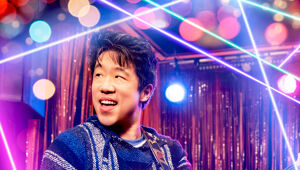
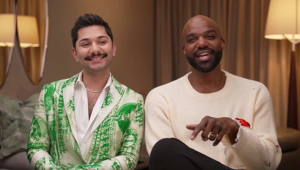
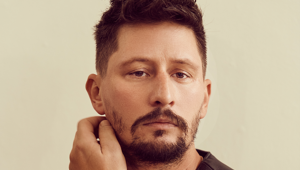
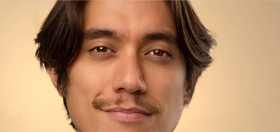


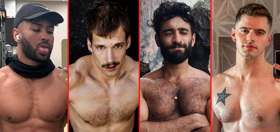
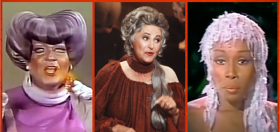
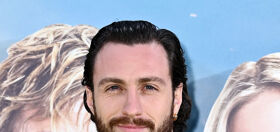



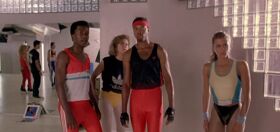
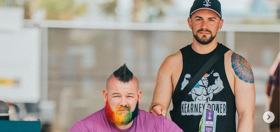
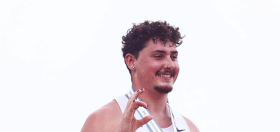

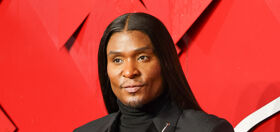
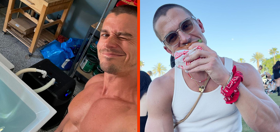
Blue Zoo
He was the only out gay cast member? What about Jonathan Groff? Jonathan came out in 2009 and Hamilton didn’t open until 2015.
Kangol2
Groff was in the pre-Broadway and Broadway versions, I think (Groff was in the version I saw, which also featured Lin-Manuel Miranda himself, etc.), so there were at least 2 out gay cast members.
Kangol2
He’s stunning. I’m glad I got to see it with Leslie Odom Jr. live, though. The politics of the show are kind of counterintuitive to where we are as a society these days, but it’s still enjoyable to watch, and Disney+ knows they’re going to be reaping a windfall from the viewership.
QNetter
Brian D’Arcy James played King George off-Broadway. He was not available for Broadway when it opened because he was committed to SOMETHING ROTTEN. So Groff went in. (And after he was out of ROTTEN, James followed Groff.) So he was in fact the only out gay member of the original off-Broadway cast.
(See the “Schuyler Georges” #Ham4Ham video.)
trsxyz
What an amazing guy!
succubus
does anyone know what happened to PLAYS WELL WITH OTHERS?
did it die of syphilis?
i noticed the mouth chancres were starting to smell…real bad
rest in cool peace….NOT
Kangol2
I hope he’s OK. Same with Bob LaBlah. They might just be taking a Queerty break.
Cam
So on a post about an out Black actor, the right wing troll account has to take it’s obsession so far, that it continues to attack an account that’s called it out, even though that account hasn’t even posted.
We get it, you hate the idea of famous people being out, and Black people getting attention.
Wheelerman
Good interview. I was fortunate to see Hamilton with original cast twice. Jonathan Groff played King George, and was Tony nominated. He has been out as gay since 2009, so some background check should’ve been done. Despite that bit of a glaring error; it is a terrific show that I look forward to seeing again on TV.